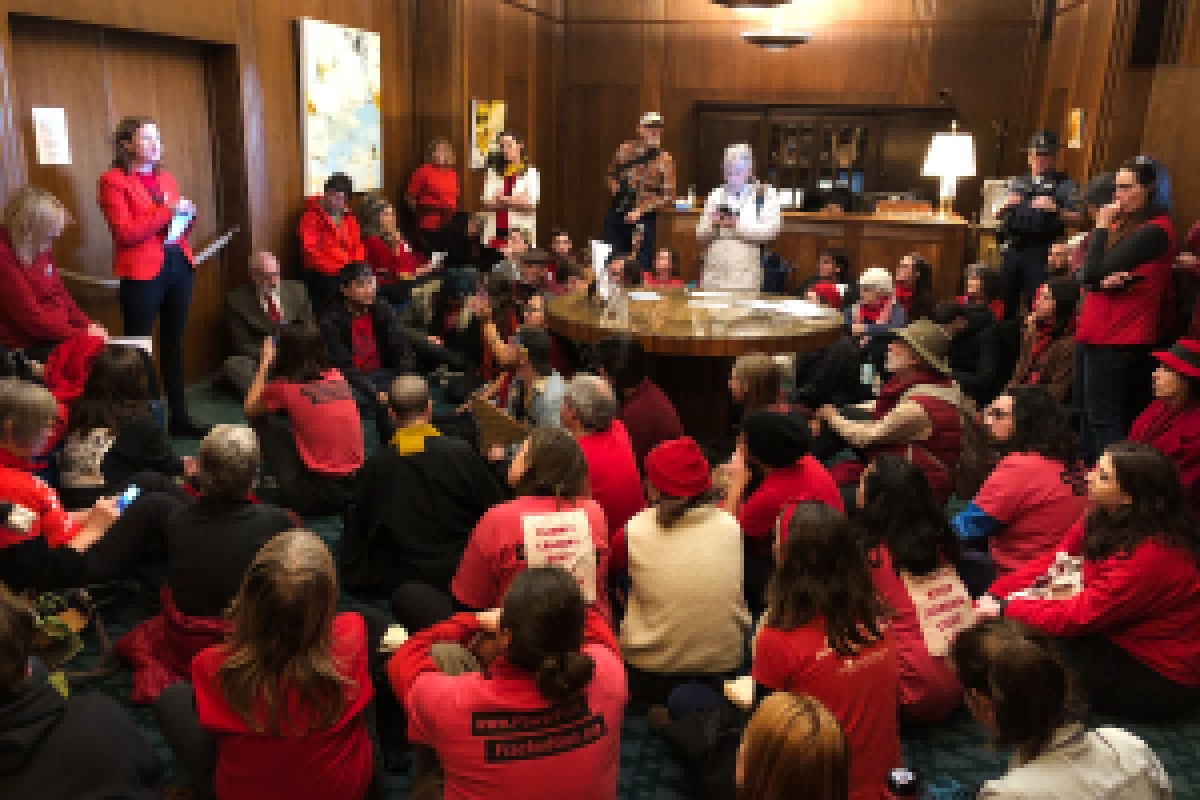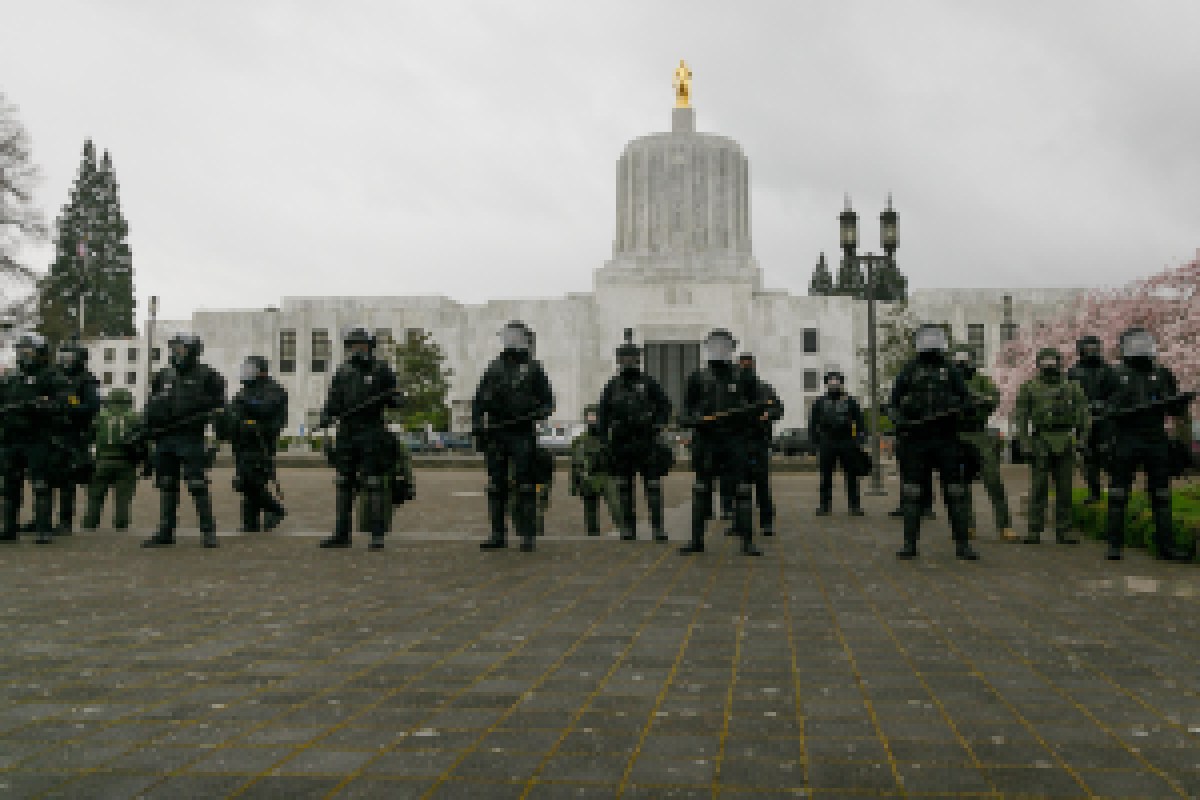
Protesters opposed to the Jordan Cove Pipeline project in Coos Bay, Ore., stage a sit-in at the office of then-Gov. Kate Brown on Feb. 20, 2020.
The activists of Siskiyou Rising Tide are not new to being watched. Founded in 2016 under the name Southern Oregon Rising Tide, the direct action climate justice group was a key player in the yearslong battle to stop the Jordan Cove Energy Project, a 229-mile natural gas pipeline that threatened to be the largest single emitter of greenhouse gasses in Oregon.
Alongside a coalition of environmental and Indigenous groups, Siskiyou Rising Tide faced major police counterinsurgency efforts, including aggressive monitoring funded by Pembina Pipeline Corporation, the Canadian fossil fuel company behind the project. But a dense web of interagency and corporate surveillance was unable to curtail the Jordan Cove opposition: In a rare victory for the climate movement, Pembina canceled the project in 2021.
A new trove of internal police emails, however, reveals that the intrusive and overreaching surveillance practices that developed around the pipeline project have remained firmly in place, even years after Pembina pulled out of the area.
Obtained through public records requests by Information for Public Use and Siskiyou Rising Tide and shared exclusively with The Intercept ahead of their publication, the emails show a policing apparatus that treats even the most placid social justice activities — like vigils and Juneteenth celebrations — as sites of criminal threat.
“As the Jordan Cove pipeline was defeated around 2020, Siskiyou Rising Tide pivoted to focusing on housing and racial justice issues, and these records requests were part of an attempt to understand what the surveillance landscape looked like post-Jordan Cove,” the Information for Public Use said in a statement shared with The Intercept.
The emails show that, from 2016 to 2023, the Medford Police Department coordinated heavy-handed police responses to peaceful rallies and protests, tracked activist groups’ social media pages, and consistently treated typical, First Amendment-protected activity as a potential crime worthy of law enforcement scrutiny.
Sam Becker, a member of Information for Public Use, wrote in a Signal message that the Medford Police Department’s overreach included surveilling a Black teenager’s vigil, pushing back against the Oregon Health Authority’s choice to fund a harm reduction nonprofit, and monitoring a reproductive justice organization after receiving a tip from a member of an evangelical anti-abortion group.
Information for Public Use and Siskiyou Rising Tide believe that the surveillance activities revealed in the email trove constitute a violation of both First Amendment protections and an Oregon-specific law, ORS 181A.250, which prohibits law enforcement agencies from collecting and maintaining “information about the political, religious or social views, associations or activities” of individuals, groups, or business, unless the police have “reasonable grounds to suspect the subject of the information is or may be involved in criminal conduct.”
“Monitoring social media accounts available to the general public does not violate any part of the constitution or any Oregon statute,” wrote Medford City Attorney, Eric B. Mitton, in a statement to The Intercept. “Law enforcement agencies, including the Medford Police Department, actively look at the public social media profiles of organizations and individuals when there is reported or self-evident concern of a public safety interest.”
While some activists involved in Jordan Cove protests had been arrested in the past, the police department emails do not contain evidence of ongoing criminal conduct. Rhetoric about “usual suspects” is scattered throughout the emails, but the activities which they are suspected of carrying out are peaceful protests, mutual aid projects, and protected political speech. The surveilled events are often described as involving a few dozen activists, gathering to express support for social, racial, and reproductive justice, before returning home without incident.
Oregon has long been a hub for far-right, white supremacist organizing, and Medford is located in a firmly conservative county. As is all too common, and indeed unsurprising, antifascist and left-wing organizers take up an outsized amount of law enforcement focus. The obtained emails evidence both the police’s disconcerting commitment to monitoring the left and an embarrassing squandering of city, state, and federal resources toward activities like picking through social media posts about social justice issues.
In one email exchange from June 2020, Medford Police Department patrol lieutenant Darrel J. Graham asked then-Medford Police Department crime analyst Divya Fisher to identify and investigate Siskiyou Rising Tide’s members after the group condemned local law enforcement officers’ treatment of unhoused people during the early months of the Covid-19 pandemic.
In response, Fisher and other officers combed through social media posts until landing on a Facebook post of one man, Leonard Higgins, who cited the Rising Tide and encouraged people to email the Medford City Council to urge an end to police harassment of unhoused people. The police then ran a background check on the 68-year-old longtime environmental activist.
In the entire email thread, “there is no focus on addressing the complaints against the police, i.e. remedying the wrong being done to unhoused people,” noted the Information for Public Use’s statement. A member of Siskiyou Rising Tide told The Intercept that at the time of that email exchange, the online information was out of date and Higgins was no longer involved with the group.
The monitoring of protests and events for racial justice — predominantly after the summer of 2020, when nationwide Black liberation uprisings followed George Floyd’s murder — were particularly egregious in their overreach. The emails show numerous officers across departments dedicating hours of time and research to scrutinize people who attended a vigil organized for Aidan Ellison, a Black teen from nearby Ashland who was shot dead by a middle-aged white man.
Dozens of emails back and forth in late 2020 focus on the vigil and its organizers. One email thread contains an information sheet from the Medford Police Department’s “Tactical Information Unit,” offering a summary of research on the vigil plan. Other emails note that a camera installed by the city the previous summer could be used to watch the vigil, as well as the Facebook feeds of local activists known to the police.
As the vigil for the slain teen began, the cops quipped about the host of the Facebook livestream. “I figured he’d be there,” Jenette Bertocchi of the Ashland Police Department wrote to Medford’s Fisher while tuning in the organizer’s social media feed.
Fisher replied that “it wouldn’t be a party” without the activist in question. (Ashland Police did not respond to a request for comment. Fisher did not respond to The Intercept’s attempts to reach her.)

Police officers stand near the Oregon State Capitol building during opposing demonstrations between antifascist and far-right groups in Salem, Ore., on March 28, 2021.
In another multi-agency email thread from 2022, officers discuss the then-upcoming trial of Floyd’s murderer, former cop Derek Chauvin. “As you know, I believe these officers will be acquitted of the murder charges,” wrote Medford Police Sgt. Jason Antley. (In 2012, Antley was cleared of wrongdoing by a grand jury for shooting and killing a man wielding a knife.)
“This is likely to spark another large scale set of protests,” Antley added and asked his colleague to “dig around on social media to see if anyone is talking about this.” No disruptive protests took place in the area.
Following the fall of Roe v. Wade in 2022, the police focus turned toward reproductive rights protests. One group, the Rogue Valley Pepper Shakers, a queer-led organization founded in 2020 by young people in the area, was actively monitored for its reproductive justice activism; the group distributes contraception and reproductive health information, shares information about anti-abortion extremists, supports local queer spaces, and promotes harm reduction. According to an email from Medford Police Department’s Antley, the police were alerted to one planned abortion rights protest by Brett White, a member of the Rogue Valley Saltshakers, a far-right anti-abortion group that galvanized the creation of the Pepper Shakers.
“Seeing these emails has proven to us that the police see us as an active threat to our communities, even in the absence of evidence.”
“Seeing these emails has proven to us that the police see us as an active threat to our communities, even in the absence of evidence,” Sam Strong, a member of the Rogue Valley Pepper Shakers, told The Intercept. “The observation and keeping tabs is no shock to us however it’s extremely concerning.”
In some of the most recent email exchanges obtained, police and city officials expand on their surveillance efforts with an attempt to intervene in a radical health care group’s funding. In March, Stabbin’ Wagon, a harm reduction group that distributes free clean syringes and opioid reversal medications like Narcan, was awarded $1.5 million from the Oregon Health Authority to build a peer-respite center: a community-based alternative to the hospitalization model of recovery and mental health treatment.
In one email, the Medford City Manager Brian Sjothun asks a city lobbyist who they “need to contact at the State regarding this grant,” calling it a “disaster waiting to happen.” In another email, Medford Chief of Police Justin Ivens contacted the Oregon Health Authority directly, expressing “concerns” — seemingly an effort to pressure a state agency out of awarding funds to a legitimate, deserving nonprofit. In a 2021 email between the police department’s former crime analyst, Fisher, and other officers, Stabbin’ Wagon’s founder Melissa Jones was named as one of the cops’ “known protest players.”
The specific emails discussing Stabbin’ Wagon’s funds were already reported by Oregon-based independent news service, The Lund Report, in September. Now, they can now be understood in the context of years of police communications committed to suppressing and criminalizing all aspects of liberatory organizing in the local area — including efforts like Stabbin’ Wagon to provide services to simply keep people alive during an ongoing, deadly opioid crisis. Despite police and city meddling, Jones is reportedly on track to receive the Oregon Health Authority grant.
“City staff expressing opinions about a State grant award or asking State officials questions about that State grant award is not uncommon,” wrote Mitton, the city attorney. “It is routine and appropriate for inquiries to be made to public entities like the State of Oregon about how that public entity is allocating its resources.”
Stabbin’ Wagon is not alone in continuing its work despite the knowledge of consistent police surveillance and targeting; the heavily surveilled activists in Medford and beyond expect little else from law enforcement. Strong of the Rogue Valley Pepper Shakers told The Intercept, “I hope the police enjoy watching us serve our community with dignity and autonomy and even learn something from it, but then again — if they had any dignity, they wouldn’t be cops.”









